- Home
- Brandon Sanderson
Lies of the Beholder Page 6
Lies of the Beholder Read online
Page 6
“He was wonderful,” Ivy said. “Calm with everyone. Interested in everyone.”
“He loved a mystery,” Ngozi added. “He loved questions. He was the part of us that kept wanting to learn.”
“I swear,” I noted, “half the aspects exist because he was interested enough to get me digging into some strange topic.”
“He hated charging people for our work,” J.C. said. “Always wanted to give everyone a pro bono deal. Terrible businessman. Good man though.”
“He was crazy in his own wonderful way,” Ivy said. “Remember how people would get when they found out that one of your hallucinations had his own hallucination?”
I smiled. Maybe … maybe I could imagine Stan, Tobias’s astronaut friend. I didn’t usually have that much control.
The others continued to reminisce, telling stories about Tobias. Jenny sat back, writing it all down. And it did feel better to talk about it. To remember. Maybe for once she’d actually helped.
Eventually we pulled up to a small business building—maybe four stories high. I didn’t know if Sandra was inside, but hopefully they’d at least have information on where she was being held.
I just had to break in and steal it.
NINE
“Same car,” Ngozi said, peering through the binoculars out the window of our limo. “Big silver SUV that was parked on the street near the hot dog cart. I can barely make out the license plate by the streetlights.” She hesitated. “Anyone heard of a ‘Lexus’ make of cars?”
The aspects shook their heads. How many more aspects could I lose before I was just … gone? A drooling vegetable?
J.C. waved for the binoculars, and Ngozi wiped them down with a disinfecting wipe, then passed them over. He looked over the building. “No way to guess at their security level. Here’s what we do: We go back to the house and I gather a team of specialized aspects. Chin, Lua, Marci.
“We work some contacts, grab the architectural plans—and, if we’re lucky, find out who installed this building’s security. We might be able to find out who owned the building before this Kyle guy bought it, and—if they can be bribed—get an even better idea of what we’re dealing with. We come back in two days’ time, at three in the morning, when…”
I opened the door and stepped out into the night.
“… or not,” J.C. said, with a loud sigh.
I knocked on the driver’s window, which Barb rolled down. “Go park the car someplace out of sight,” I said, then started out toward the office building.
J.C., Ivy, Ngozi, and Jenny followed me. We crossed the dark lawn in a low run. Most parts of the building were floodlit, but on the east side the floodlight was flickering, mostly dark. So I approached from that side.
Jenny hung back the farthest, looking awkward as she tried to hide behind a tree. At least she was playing by the rules now. Ivy had done this sort of thing before, and crept beside J.C. and me with her shoes—not the most practical for an infiltration—held in her hand. I was worried most about Ngozi, but she was smiling as she settled in beside me near some shrubs.
“It’s been a while,” she whispered as we crouched down in the darkened shadow of the shrubbery. “I feel … I feel good. Like I can do this. Huh. Oh! Don’t brush those leaves! Do you know what kinds of chemicals they spray on these things to keep them looking this green?”
J.C. scanned the side of the building. “You insist on doing this now?”
“If Sandra is in there, I want to know. We can’t wait two days while they might move her.”
He shared a look with Ivy, who shrugged, then nodded.
He breathed out. “You people are all crazy.”
“Hey!” Ivy said. “I’m the psychologist here. I get to define who is crazy, and only four of us are.”
J.C. counted the five of us. Then, hesitantly, pointed at himself.
“J.C.,” she said flatly, “you’re as crazy as they come. How many gun magazine subscriptions do you have?”
“… All of them,” he admitted.
“In how many languages?”
“… All of them.”
“And how many of those languages other than English do you read?”
“… None of them.” He peered through the bushes with his binoculars. “But I can read the pictures. Those aren’t in Canadian or whatever, eh.”
“Who’s the sane one, then?” I asked Ivy. “Me?”
“Heavens no. It’s Ngozi. Have you seen the chemicals they spray on these plants? You should really listen to her.”
Ngozi nodded in agreement, but J.C. just chuckled. And I … I smiled a little. It was hard to feel any levity after what had happened, but I realized I still needed it.
Thank you, Ivy. “So how do we get in?” I asked.
“Air ducts?” Ngozi asked.
J.C. rolled his eyes. “Have you ever actually seen an air duct that a person could climb through? Like, one that was both big enough and wouldn’t collapse from the weight of a person inside?”
“Sure,” she said. “I’ve seen lots. On TV.”
“Yeah, well, how about next time we’re doing crime scene analysis, I yell ‘enhance’ like a billion times.”
“Point taken.”
“Fortunately,” J.C. said, holding up the binoculars again, “this place doesn’t look too secure. I don’t see any external cameras—they could easily be hidden, mind you—and no lights in the windows indicates that if they’re patrolling on foot, they’re doing so rarely. Of course, these modern joints don’t need patrols—everything is wired to go crazy the moment you breathe on the wrong door.
“Best way in is to do what Audrey always says—look for the human error, rather than trying to break the machines.” He pointed, and I spotted a window on the first floor that had been propped open with a book, perhaps for fresh air.
“We go all at once,” J.C. said. “If they’re watching the area via camera, stringing it out is worse. This way, at least there’s a chance the security guard will be looking away at the moment we run. Ready?”
We each nodded.
J.C. thumbed over his shoulder toward Jenny, who observed from farther back—perhaps not trusting herself to get close. “And her?”
“Ignore her,” I said. “She … won’t show up on their screens. She, um, has a stealth system.”
“Not the writer chick,” J.C. said, rolling his eyes. He pointed again. “Her.”
I looked again. Barb was scuttling across the grass. She arrived, out of breath, and crouched next to me. “All right!” she said. “Sneaking in? I can dig that. What do you want me to do?”
“Go back to the car.”
“But—”
“Go back to the car, drive off, and go to your uncle’s birthday party. That’s happening tonight, right? Grab some cake, Barb.”
“You’ll need—”
“I’ll get a cab. Go.”
Her face fell, then she nodded and slunk off. If she exposed me to the security guards in there … I shook my head, glancing back at the team—and was met with uniform looks of disapproval.
“What?” I said. “We don’t need real people.”
“There are things she could do that we can’t,” Ngozi said.
“I’m never one to turn away someone with a can-do attitude,” J.C. said.
Ivy just squeezed my arm. “What if that’s the problem, Steve? What if you can’t just live with us? What if turning inward is what’s causing all of this?”
“What? You’re that offended because I turned my chauffeur away?” They were all crazy.
Besides. Maybe I didn’t want someone watching as I went through … whatever was happening to me. Can’t a man suffer a breakdown in private?
“Let’s go,” I said—then didn’t give them a chance to object as I ran for the building. The others followed, even Jenny. I reached the side of the building, puffing, then approached the open window. It was the type that slid up and down, and through the glass I saw what looked like a service closet.
There were buckets on the floor, and it smelled faintly of cleaning fluids. Perhaps they’d been airing it out.
I pulled up the window, then slipped through. I managed to do it without making any noise or knocking over the buckets on the ground, though I bumped my head on a shelf in the dark room as I stood up. I saw stars, and my vision flashed, but I managed to keep myself from shouting out.
I held open the window for the others, and J.C. gave me a thumbs-up as he climbed in. He probably hadn’t seen me knock my head, but I figured I was doing better than I might once have. Our training sessions were proving good for something.
Ivy did knock over one of the buckets, but fortunately, the resulting clatter wouldn’t be audible to anyone but me—though she shot me a chagrined look after doing it. J.C. helped Ngozi in, then Jenny came last.
I replaced the book, rested the window on it, then moved to the door. I took a deep breath and cracked it open. If they had the doors alarmed, this would reveal me.
The light beyond the door was much brighter than I expected. I blinked against the garish, sterile glare. The hallway seemed empty, though J.C. pointed upward to a little knob on the ceiling, a hemisphere of reflective black glass. Security camera.
I pulled back into the room and closed the door with a click. After thinking a moment, I dialed Kalyani on the phone. “Grab Chin,” I said softly.
A moment later, he was on the line. “Yeah, boss?”
“We’re infiltrating the Detention Enterprises place,” I said. “We’ve breached the perimeter, but the hallways have some surveillance cameras.”
Chin chuckled softly. “You’re surprised that a group that runs prison facilities has a basic level of security?”
“He’s been reckless lately,” J.C. said. “More so than usual.”
“All right. Well, have a look at your phone, boss. You see an app called SAPE? That’s your signal analysis booster. Give it a try, and set the thing to transmit data to my laptop.”
“Done,” I said, flicking a few buttons, watching data appear on my screen.
“Hm…” Chin said. “Visible guest wi-fi … hidden internal signals not broadcasting identities … Okay, cool. They’re using AJ141 wireless cameras.”
“That’s good?”
“Kind of,” Chin said. “So those little camera nodes broadcast signals back to a central watch station, right? And the night watchperson there cycles through the cameras.”
“Can you hack it?”
“Nope,” Chin said. “Not a chance. We’d need to plug into the thing directly, which—if you hadn’t guessed—would kind of involve going into its field of view. However, watch the signal on your phone. See that little blip?”
“Yeah. What is it?”
“That’s a ping for data, which is causing the camera to reset briefly and start transmitting. Awkward. They probably configured new cameras to work with their older security setup. It means that while you can’t hack the system…”
“We can see when one of the cameras is transmitting,” I said, smiling. “Nice work, Chin.”
“Yeah, well, don’t get caught, all right? We’ve had enough bad news today.”
“Speaking of that…” Kalyani said from near Chin, her voice timid. “Mr. Steve?”
“What?” I said, feeling cold.
“Lua is gone.”
“I thought you said you had everyone!”
“We thought we had, but he ran out to grab something from his little survivor hut out back. And he didn’t come back! We sent four people out together looking for him, but he’s gone.”
I leaned back against the wall, feeling sick. No. Not again …
“Hey Achmed?” J.C. said to Kalyani, leaning down to the phone.
“Please don’t call me that.”
“Yeah. Sorry. Trying to be funny, you know…” He took a deep breath. “There’s a key hidden in a box under the third brick on the back path. Go grab it.”
“For what?” Kalyani asked.
“It opens my gun locker, the one in the main hallway, where I keep the emergency shotguns in case of home invasion. Distribute them among the others, and you guys hole up in there, okay? Stay in one room, barricade the door … and be careful. If Lua goes nightmare, he might ignore things like locks and barricades. Guns should still work though.”
“I…” Her voice trembled. “Okay. Okay, we’ll do it.”
“Good. Take care.” He looked up at me, uncharacteristically reserved, then unholstered his sidearm. “Guess you were right, Skinny. Waiting two days to get in here wasn’t an option.”
“Do you want to tell me,” Jenny said from right beside me, “how exactly this makes you feel?”
I jumped, and suddenly felt an irrational anger at her. She stood there, scribbling, like she didn’t even care what was happening to everyone else.
“Either you are going to shut up,” I said, “or we are going to come to blows.”
“False dichotomy,” she said. “There are more than two options. We could—”
“Go,” I said, pointing back at the window.
“What?” she said, lowering her pad.
“Go. Now. Or I swear, J.C. will shoot you. Break the rules, get away, vanish—I don’t care how. But go away!”
She vanished in a heartbeat.
I trembled inside, then felt sick. The other aspects stood silently. “Don’t look so betrayed,” I snarled. “I didn’t ask for her. I didn’t want her. I don’t even know what kind of specialty she was supposed to represent.”
I waited for the camera outside to go through a cycle, counting how long we had between its bursts. A minute and a half. Plenty of time.
J.C. led the way out into the hallway.
TEN
The cameras were spaced evenly through the hallways, but with my phone, I was able to pick out the closest signals. I got into a good rhythm, delaying underneath one camera while it was still offline, then quickly moving when the next one stopped transmitting. I tried doorknobs as I passed, hoping to find one unlocked that would provide computer access.
I didn’t have luck at that, but Ngozi did spot something through the window into one office: a map of the facility on the back wall. I snapped a picture, then found my way to a spot around a corner and at the landing of a stairwell where we thought we’d be out of sight of the two nearest cameras.
Here, I took a breather while my aspects gathered around the phone to inspect the map. My heart was beating quickly, and my shirt was damp with nervous sweat. But so far, no alarm.
That doesn’t mean anything, I reminded myself. Any alarm would be silent, only alerting security. Still, this entire place seemed eerily quiet. Empty, but bright, lit up white.
“There,” J.C. said, pointing at the picture of the map, with its breakdown of four floors. One larger bit of text read: Subject testing and holding cells.
“What you want to bet she’s in there?” J.C. asked.
I nodded. We went up the stairwell—dodging a camera in the middle of the next flight—and ended up on the top floor, near those holding cells. Here, unfortunately, we encountered our first live guards. I peeked around a corner, and found them right in the hallway. They leaned against the wall, tasers on their hips, chatting softly about football.
I backed away, looking down the corridor behind me, but the map said that direction only led to a dead end at a place labeled IMAGING CENTER.
I retreated to the top of the stairs, in a spot out of sight of the cameras. “Ideas?” I whispered to my aspects.
“You could take two guards,” J.C. said.
Fat chance of that.
“I doubt we can talk past them,” Ivy said, “considering the circumstances.”
“Well,” Ngozi said. “There’s an air duct over there, down that hallway to the left.”
“Not that again,” J.C. said. He squinted. “We wouldn’t fit.”
“I wasn’t thinking of going into it ourselves.…”
* * *
I waited,
nervously, hidden on the steps and barely daring to breathe as kitten sounds echoed in the hallway above.
It took only a few minutes for the two men to approach, leaving their post. Confused, they passed right near my stairwell, then continued on down the hallway, turning left. They probably shouldn’t have left their posts, but it was perfectly natural. Who wouldn’t be interested by the sounds of a lost kitten?
They’d find the sounds coming from the air duct where we’d hidden—around a corner and out of sight—Sandra’s phone, playing the meowing kitten video that Audrey had been watching earlier. It had been dangerous turning on Sandra’s phone, but we’d put it into airplane mode and used a direct Bluetooth connection between my phone and it to load the cat video.
I heard the men in the corridor nearby, calling to the kitten in the air duct. I slipped past them, around the corner. Heart pounding, I walked underneath a sign that read, SECURE AREA—SUBJECT HOLDING. Just a little farther. Sandra. I heard … I heard her voice ahead. Singing. That old lullaby that she always—
Everything flashed white.
The hallway melted into light. I stumbled, and J.C. shouted, raising his gun and spinning around. For a moment, we were blinded.
The light vanished, and I found myself in a completely different place. Instead of the hallway, I was lying on the floor in an unfamiliar room. It was a large, open chamber with concrete walls, a high ceiling, and industrial lighting.
What had happened? I’d … been teleported, somehow?
Kyle Walters stood before me: the balding, somewhat buff man in the sport coat from earlier at the fairgrounds. I blinked, looking up at him, then at the small gathering of techy types behind him. Where had they come from? What was happening?
“Welcome, Mr. Leeds,” he said, “to the future of human incarceration.”
ELEVEN
Kyle offered a hand to help me to my feet. He had a false sort of friendliness about him, the smile of a man who would be your best friend for as long as it took to sell you a very nice pre-owned vehicle.
My surroundings had gone from a sterile hallway to an older warehouse. Not dingy, but used. Concrete floors with patches covered with chunks of carpet where computer stations had been set up. The scents were no longer of cleaning fluids, but of sawdust and someone’s microwave dinner. It wasn’t messy, it was just … real?

 Steelheart
Steelheart The Rithmatist
The Rithmatist Mistborn: The Final Empire
Mistborn: The Final Empire Oathbringer
Oathbringer The Way of Kings
The Way of Kings Redemption
Redemption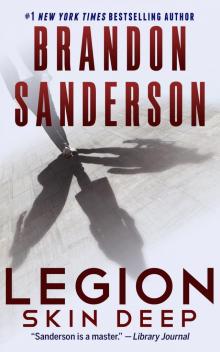 Skin Deep
Skin Deep Elantris
Elantris Snapshot
Snapshot Sixth of the Dusk (Cosmere)
Sixth of the Dusk (Cosmere) Mistborn: Secret History
Mistborn: Secret History White Sand, Volume 1
White Sand, Volume 1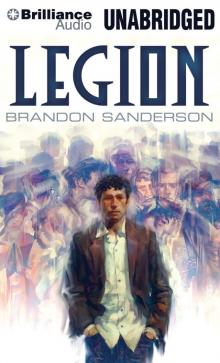 Legion
Legion The Well of Ascension
The Well of Ascension The Bands of Mourning
The Bands of Mourning Words of Radiance
Words of Radiance The Hero of Ages
The Hero of Ages Calamity
Calamity Alcatraz Versus the Scrivener's Bones
Alcatraz Versus the Scrivener's Bones The Alloy of Law
The Alloy of Law The Emperors Soul
The Emperors Soul The Dark Talent
The Dark Talent The Gathering Storm
The Gathering Storm Alcatraz Versus the Shattered Lens
Alcatraz Versus the Shattered Lens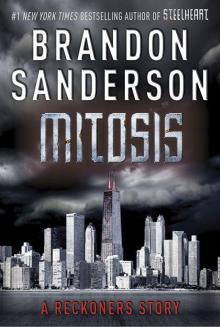 Mitosis
Mitosis Alcatraz vs. The Evil Librarians
Alcatraz vs. The Evil Librarians Rhythm of War (9781429952040)
Rhythm of War (9781429952040) Alcatraz Versus the Knights of Crystallia
Alcatraz Versus the Knights of Crystallia Warbreaker
Warbreaker Firstborn
Firstborn Starsight
Starsight Edgedancer
Edgedancer Perfect State
Perfect State Shadows of Self
Shadows of Self The Way of Kings Prime
The Way of Kings Prime Starsight (US)
Starsight (US) Shadows for Silence in the Forests of Hell
Shadows for Silence in the Forests of Hell Arcanum Unbounded: The Cosmere Collection
Arcanum Unbounded: The Cosmere Collection Awakening
Awakening Firefight
Firefight Dawnshard
Dawnshard Defending Elysium
Defending Elysium White Sand
White Sand Infinity Blade: Redemption
Infinity Blade: Redemption The Final Empire
The Final Empire Skyward
Skyward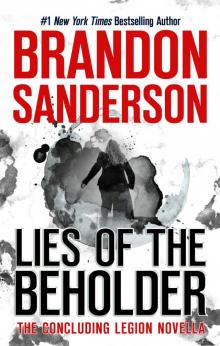 Lies of the Beholder
Lies of the Beholder Elantris e-1
Elantris e-1 Steelheart r-1
Steelheart r-1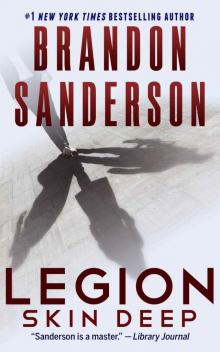 Legion: Skin Deep
Legion: Skin Deep Well of Ascension
Well of Ascension Mistborn
Mistborn Alcatraz versus the Evil Librarians
Alcatraz versus the Evil Librarians The Final Empire m-1
The Final Empire m-1 The Way of Kings (Stormlight Archive, The)
The Way of Kings (Stormlight Archive, The) Calamity (The Reckoners)
Calamity (The Reckoners) Legion and the Emperor's Soul
Legion and the Emperor's Soul Legion: The Many Lives of Stephen Leeds
Legion: The Many Lives of Stephen Leeds The Mistborn Trilogy
The Mistborn Trilogy Bands of Mourning
Bands of Mourning Alcatraz
Alcatraz The Hero of Ages m-3
The Hero of Ages m-3 Alcatraz vs. the Shattered Lens
Alcatraz vs. the Shattered Lens The Alloy of Law: A Mistborn Novel
The Alloy of Law: A Mistborn Novel The Way of Kings sa-1
The Way of Kings sa-1 Infinity Blade: Awakening
Infinity Blade: Awakening Sixth of the Dusk
Sixth of the Dusk The Stormlight Archive
The Stormlight Archive The Aether of Night
The Aether of Night